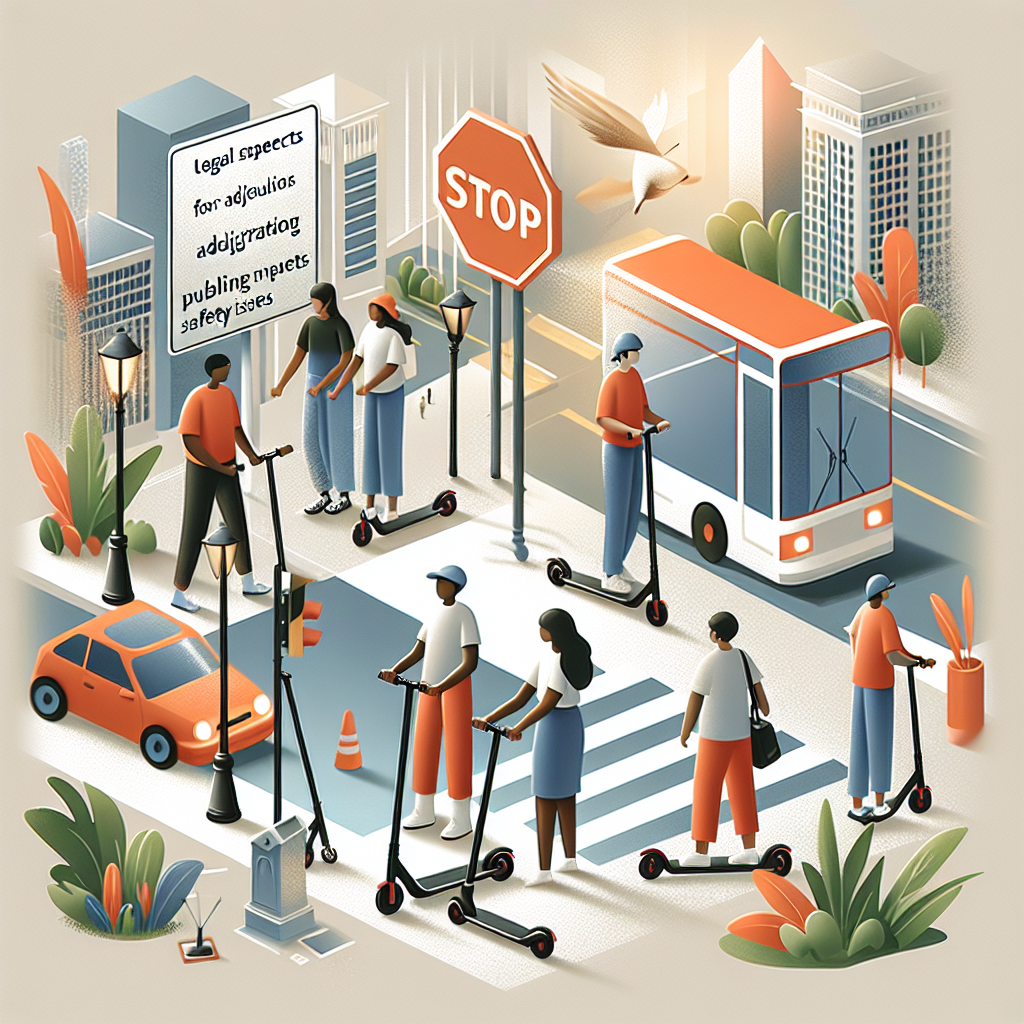Have you ever wondered if electric scooters are street legal? It’s a question that has gained significant attention as these compact and eco-friendly forms of transportation become increasingly popular. With their sleek design and quiet operation, electric scooters offer a convenient alternative for commuting in congested city streets. However, the legality surrounding their use on public roads remains a grey area. This article will explore the regulations and guidelines governing electric scooters, shedding light on whether you can confidently embrace this mode of transportation for your daily commute or leisurely rides around town.
Safety Requirements for Electric Scooters
Electric scooters have become a popular mode of transportation, especially in urban areas. As with any vehicle, safety should always be a top priority. To ensure the safety of riders and those around them, there are specific safety requirements that must be followed when using electric scooters.
License and Age Restrictions
One of the most important safety requirements for electric scooters is adhering to license and age restrictions. In many jurisdictions, a valid driver’s license is required to operate an electric scooter on public roads. This is to ensure that riders have a basic understanding of traffic laws and can safely navigate through traffic. Additionally, there may be age restrictions in place, with most jurisdictions requiring riders to be at least 16 years old.
Safety Equipment
Another crucial aspect of ensuring the safety of electric scooter riders is the use of appropriate safety equipment. Just like when riding a bicycle or motorcycle, wearing a helmet is highly recommended. Helmets can greatly reduce the risk of head injuries in the event of an accident. In addition to helmets, riders should consider wearing elbow and knee pads to protect themselves from scrapes and bruises.
Maximum Speed Limit
Every electric scooter comes with a maximum speed limit, and it is essential to adhere to this limit for both the rider’s safety and the safety of others. The maximum speed limit can vary depending on the specific model of the scooter and local regulations. It is important to familiarize yourself with the speed limit of your scooter and always ride within a safe and reasonable speed.
Weight and Size Restrictions
Electric scooters also have weight and size restrictions that must be followed. These restrictions are in place to ensure that the scooter is not overloaded and can be properly controlled by the rider. Exceeding the designated weight limit or carrying excessively large items can make it challenging to maintain balance and control, leading to accidents. It is crucial to follow the manufacturer’s guidelines regarding weight and size limitations to ensure a safe riding experience.

Street Legal Regulations for Electric Scooters
When it comes to electric scooters, not only do they need to meet specific safety requirements, but they also need to comply with street legal regulations. These regulations vary from jurisdiction to jurisdiction, so it is essential to understand the rules before taking your electric scooter on public roads.
Classification of Electric Scooters
Electric scooters are typically classified into different categories based on their specifications, such as maximum speed and motor power. These classifications help determine the specific regulations that apply to each type of scooter. It is important to understand which category your electric scooter falls into and the corresponding regulations that must be followed.
Registration and Licensing
Just like other motorized vehicles, some jurisdictions require electric scooters to be registered and obtain the necessary licensing. This ensures that the scooter is properly identified and can be traced back to its owner if needed. Registration and licensing requirements may include providing proof of ownership, proof of insurance, and obtaining a unique identification number for the scooter.
Insurance Requirements
In some areas, having insurance for your electric scooter is mandatory. This is to protect both the rider and other people involved in the event of an accident. Insurance requirements may vary depending on the jurisdiction, so it is crucial to check with local authorities to ensure compliance.
Rules for Riding on Roads
When riding an electric scooter on public roads, it is essential to follow the established rules and regulations. This includes obeying traffic signs and signals, yielding to pedestrians, and using designated bike lanes when available. Riders should also be aware of their surroundings, use hand signals when turning, and maintain a safe distance from other vehicles. Adhering to these rules ensures the safety of the rider as well as other road users.

State and Local Laws on Electric Scooters
In addition to the safety and street legal requirements, electric scooter riders must also familiarize themselves with state and local laws that specifically govern their use.
Varying Regulations
State and local laws regarding electric scooters can differ significantly. It is important to note that what may be permissible in one jurisdiction may not be allowed in another. Some areas may have more lenient regulations, while others may have stricter requirements or even ban electric scooters altogether. It is crucial to research and understand the specific regulations in your location to avoid potential legal issues.
Specific City Laws
Many cities have implemented their own set of laws and regulations for electric scooters. These may include rules on where scooters can be ridden, designated parking areas, and specific riding guidelines. It is important to familiarize yourself with the specific laws of the city or cities you plan to ride in to ensure compliance and avoid any penalties.
Statewide Rules
In addition to city regulations, some states have established statewide rules that govern the use of electric scooters. These rules may encompass aspects such as rider age restrictions, helmet requirements, and speed limits. Understanding and adhering to these statewide rules is necessary to avoid legal complications.
Restricted Areas
Certain areas may be designated as off-limits for electric scooters. This can include sidewalks, certain streets, or specific locations with high pedestrian traffic. It is essential to respect these restrictions and ride within permitted areas. Ignoring restricted areas not only violates the law but also poses a safety risk to pedestrians and the rider themselves.

Impact of Electric Scooters on Transportation Laws
The growing popularity of electric scooters has had a significant impact on transportation laws and regulations. As cities and transportation authorities adapt to this new mode of transportation, various aspects have been affected.
Infrastructure and Traffic Safety
The rise of electric scooters has prompted cities to reassess their infrastructure and make adjustments to accommodate this mode of transportation. This can include adding more bike lanes, improving road surfaces, and implementing additional traffic safety measures. By integrating electric scooters into existing infrastructure, cities strive to ensure the safety and convenience of riders.
Shared Scooter Programs
Shared scooter programs, where multiple users can rent electric scooters for short-term use, have gained popularity in many cities. These programs have introduced a new dynamic to transportation laws and regulations, as they involve multiple users and the need for efficient distribution and management of scooters. Cities have had to create guidelines and regulations to ensure the safe and responsible use of shared scooters within their boundaries.
City Planning and Regulation
The introduction of electric scooters has prompted cities to reevaluate their transportation planning and regulations. This includes considering the impact on traffic flow, parking availability, and managing scooter fleets. City planners and policymakers are working to strike a balance between accommodating electric scooters and ensuring the overall safety and functionality of transportation systems.
Legal Challenges
The rise of electric scooters has not been without legal challenges. Some jurisdictions have faced legal battles regarding the legality and regulation of electric scooters. These challenges have led to debates about public safety, accessibility, and the rights of electric scooter riders. As the use of electric scooters continues to evolve, it is likely that more legal challenges will arise, prompting further refinements to existing laws and regulations.

Enforcement of Electric Scooter Laws
The enforcement of electric scooter laws is a critical component in ensuring compliance and promoting the safety of riders and the general public.
Police and Law Enforcement Efforts
Local law enforcement agencies play a crucial role in enforcing electric scooter laws. They are responsible for monitoring compliance, conducting enforcement operations, and educating riders about the rules and regulations. Police officers often patrol areas where electric scooters are commonly used, ensuring that riders are following the law and addressing any violations that may occur.
Ticketing and Penalties
Violating electric scooter laws can result in penalties and fines. These penalties may be in the form of citations, traffic tickets, or even impoundment of the scooter. The severity of the penalties can vary depending on the specific violation, with more severe penalties for repeated offenses or reckless behavior. It is essential for riders to understand the potential consequences of disregarding the laws to avoid unnecessary penalties and legal issues.
Compliance with Regulations
Enforcement efforts are intended to encourage compliance with electric scooter laws. By effectively enforcing regulations, law enforcement agencies aim to create a safer environment for both riders and the public. It is important for riders to be familiar with the applicable laws and cooperate with law enforcement officers to ensure a positive and safe experience for everyone.
Public Education and Awareness
Promoting public education and awareness regarding electric scooter laws is crucial for creating a culture of safety and compliance. Public awareness campaigns, informative resources, and educational initiatives can help riders understand their rights and responsibilities. By increasing awareness and education, riders can make informed decisions and contribute to the improvement of electric scooter safety on the roads.
In conclusion, electric scooters offer a convenient and environmentally friendly mode of transportation. However, it is essential to understand the safety requirements, street legal regulations, state and local laws, the impact on transportation laws, and the enforcement efforts surrounding electric scooter usage. By following these guidelines and being responsible riders, we can enjoy the benefits of electric scooters while ensuring the safety of ourselves and those around us.


